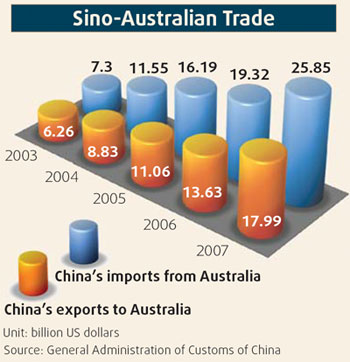AustCham set to welcome new prime minister
When Kevin Rudd visits China this week for the first time as Australia's prime minister, AustCham Beijing will mark the occasion with a dinner in his name for chamber members and friends. The visit and the profile of Australia's new government has been the subject of great anticipation.
A lot has also been made of the new Australian prime minister's ability to speak Mandarin. It is a skill shared by very few world leaders and one which any of us living in China know is not an insignificant business tool.

The election of Kevin Rudd in November 2007 marked a dramatic change in Australian politics. The previous 12 years had been defined by the leadership of the Howard government and already several controversial policy decisions have been made by Prime Minister Kevin Rudd that are contrary to stances maintained by the previous leadership.
For those with interests in China-Australia relationships, there is a sense of excitement that accompanies Rudd's unique strengths.
There is also a hard-to-define but identifiable element of pride. Rudd represents a generation of Australians that mark the first diversification away from Europe. Comparisons can be drawn between his own emergence and a nation's coming of age.
China represents a significant portion of Australia's future, and whatever subtle influence Rudd's Mandarin exerts over discussions with the Chinese government, the reality is that the symbolic ramifications go much deeper. The associated perceptions and imagery are reflected in business-to-business relationships at every level and hint at a future that is more Asia-centric, something that is already being felt right here in Beijing.
Unprecedented growth
AustCham Beijing is experiencing unprecedented growth as a number of factors contribute to greater activity in Australia-China trade. The PM's visit comes two months after the Australia Day Ball at which 740 members of the business community were honored with the appearance of many special Australian guests and contributed over 550,000 yuan to Australian and Chinese charities.
The Olympics has been another great catalyst for new business in China. However, the majority of new members to AustCham Beijing in the past 12 months have long-term China ambitions whether they were seduced by the Olympics or otherwise.
The new government has already made clear its intention to review export policy with a view to improving performance.
Simon Crean, Australia's minister for trade, outlined in February the need to "work together to drive productivity growth, enhance (Australia's) level of international competitiveness and improve export performance".
The emerging markets of India and China are highlighted as places where improvement needs to be realized and where resources need to be focused.
Members of AustCham have exclusive access to industry working groups and these have rapidly expanded over the past two years to include construction, education, Olympics and sourcing and agriculture and food, sectors that began meeting in 2008. The chamber is now appointing leadership teams for two additional groups to be created in 2008 - professional women and energy and mining.
These working groups meet to discuss specific industry issues. They represent a wealth of knowledge and a significant support for member organizations. They also represent the coalface of bilateral trade and the most relevant source of constructive dialog.
Potential opportunities
China and Australia are still working toward a free trade agreement.
The two nations produce compatible commodities and offer the business communities of one another great potential opportunities.
Australia offers a stable supply of resources to fuel a growing economy and China provides a rapidly expanding market for a diverse range of business. The bilateral trade is worth over A$52.7 billion ($48.2 billion), making China one of Australia's largest trading partners.
As Prime Minister Rudd said, "the services sector is huge and look at the financial services sector, the education sector, the sale of architectural and building services to the Chinese market - these are areas where Australia has huge potential to participate and to compete and to do well".
"But some barriers have to be removed if we're going to be fair dinkum about free trade," he said.
AustCham Beijing's overriding goal is to advance China-Australia business. It represents a broad cross-section of Australians, Australian companies and their Chinese counterparts. AustCham plays a critical role in facilitating linkages and fostering Australia-China relationships and dialog.
In April 2006, Premier Wen Jiabao meeting with then-Prime Minister Howard urged both sides to make breakthroughs in the next one to two years.
Next week, following this week's dinner with Prime Minister Rudd, AustCham Beijing will host an evening with Simon Crean, minister for trade, at which free trade negotiations will be a priority issue.
Australia's current prime minister understands the cultural nuances of both nations, permitting our bilateral trade with China to come to the fore.
Dalwyn Bateson is general manager of AustCham Beijing
(China Daily 04/09/2008 page19)














